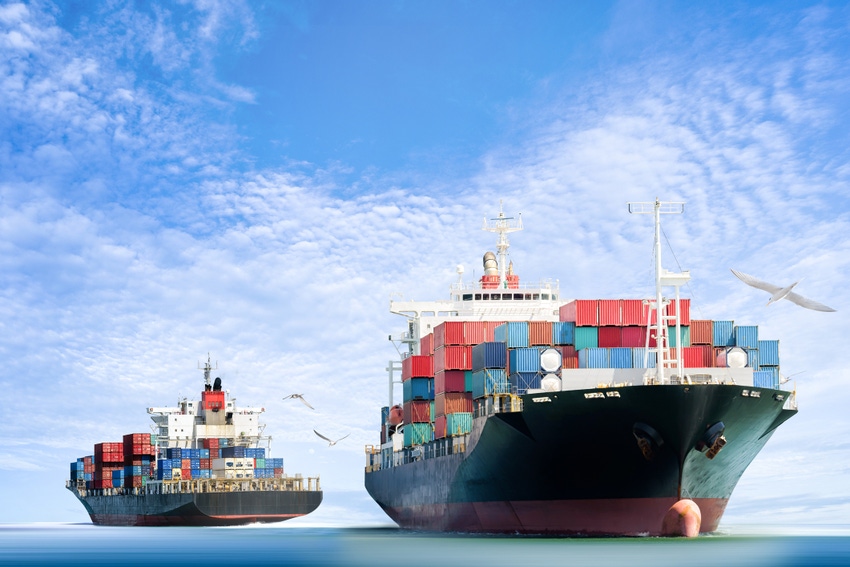Ag legislators discuss persistent port congestion issues
Federal Maritime Commission finalizing investigation in coming weeks on possible wrongdoing by Chinese shippers.

Over the past year, American producers, exporters, and entire economic sectors have grappled with widespread delays, bottlenecks and increasing fees at U.S. ports. These challenges are exacerbated by reports that vessel-operating common carriers are declining to ship U.S. agricultural commodity exports from U.S. ports.
In mid-March, a bipartisan group of House members sent a letter to Michael A. Khouri, chair at the time of the Federal Maritime Commission, voicing concerns over the slowdowns. House Agriculture Committee members – Rep. Jim Costa, D-Calif., Rep. Bob Gibbs, R-Ohio, Rep. Dusty Johnson, R-S.D., and Rep. Salud Carbajal, D-Calif. - met April 6 with the new FMC Chairman Dan Maffei and Commissioner Rebecca Dye to discuss the current situation.
VOCCs are delivering shipments to U.S. ports and then electing to leave without refilling empty containers with American goods for export. Such activity constricts entire supply chains and propels trade to move only in an inbound direction. VOCCs serve as an integral link between American producers and overseas customers, without which contracts cannot be met and the ability to compete in or even access foreign markets is threatened, the letter notes.
Johnson says the commissioners, particularly the lead investigator Commissioner Dyer, was not at liberty to speak in full detail of the ongoing investigation which could result in enforcement action. The FMC launched a fact-finding investigation in March 2020 and expanded the investigation in November.
Johnson says the commission is expecting some intel to come back in the next few weeks. There are outstanding data requests and the FMC continues to look at what shippers are shipping and who is making the decisions on returning boats empty.
“What we do know is that we've got more empty containers going from America back to Asia then we would normally have. We know that has caused quite a ripple and quite a disruption in the supply chain for American ag products,” Johnson says. “And we know that there's frankly a lot of irritation and a lot of frustration. We're trying to get a sense of exactly what actors are making what kind of decisions that are putting us in this spot.”
Related: Are American farmers being boxed out of global marketplace?
With more than 20% of U.S. agricultural production aimed for export, reaching foreign markets is essential to American producers and the viability of the agricultural sector at large, the letter notes.
When asked whether he believes that ocean carriers are acting improperly, Johnson says he doesn’t anticipate FMC’s findings will point to sabotage, but it’s clear there is a tremendous amount of demand in American for consumer goods from Asia. And these Asian manufacturers want these turns to happen much faster.
“That means they don’t want to wait around for these containers to get filled back up with ag products. I think they’re probably paying these vessels a heck of a sweat deal to get these things back,” Johnson says.
If this is true, Johnson says that’s problematic. “When you’re a common carrier, I don’t think you should be in a position of being able to cut out half of the industry because you want to cut a fatter hog on the back end.”
He questions to what extent the FMC is going to be able to enforce some of these common carrier obligations.
“If the FMC is unable to act, I think that is going to cause a tremendous interest in Congress to determine what powers Congress can give the FMC or what kind of international agreements would be necessary to bring a close to this kind of gaming of the system,” he adds.
Related Podcast: A shipping container crisis, and a conservation opportunity
In a joint statement issued by the House Agriculture Committee members, they say they look forward to continuing to work with the FMC to ensure that these shipping delays are ended expediently.
“As chairs and ranking members of subcommittees closely following the direct impacts of this situation, we are committed to resolving this issue in a timely manner and making sure that America’s farmers and ranchers can compete on the global stage,” the statement says. “We will continue to follow this issue and look forward to a bipartisan dialogue between Congress and the Federal Maritime Commission.”
About the Author(s)
You May Also Like




.png?width=300&auto=webp&quality=80&disable=upscale)
